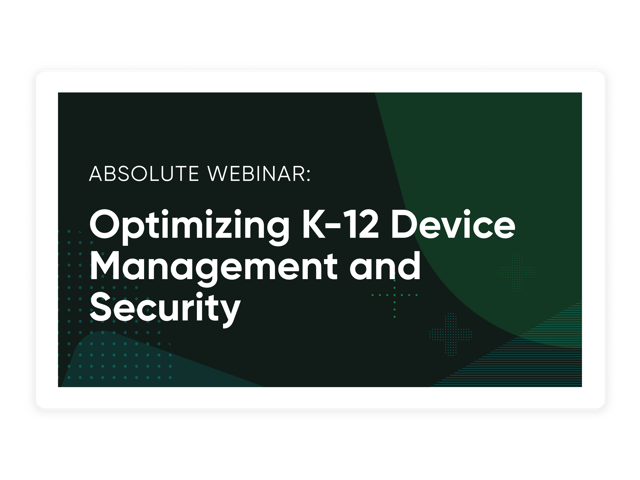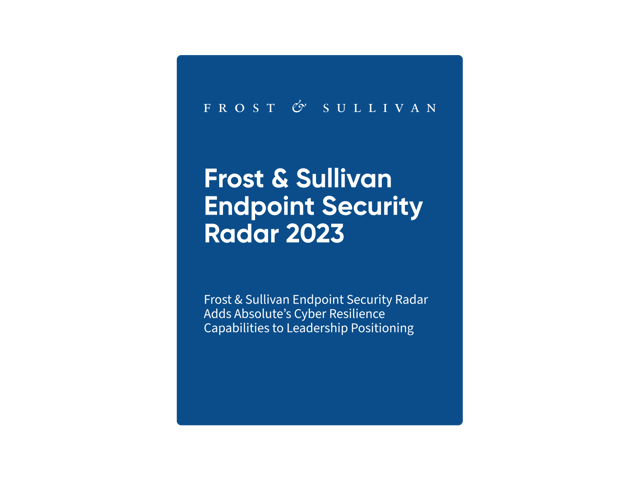| |
Serves as your source of truth for device and application health. |
Provides you a lifeline to protect at-risk devices and data. |
Most Powerful
Delivers application self-healing and confident risk response. |
| Track hardware |
|
|
|
| Report and alert on hundreds of hardware attributes
|
|
|
|
| Monitor device leasing reports
|
|
|
|
| Track new device activations and connection history
|
|
|
|
| Leverage pre-built and custom reports
|
|
|
|
| Flag missing devices and be alerted when they connect to the internet
|
|
|
|
| Track Installed Software |
|
|
|
| Report on installed software by device or population
|
|
|
|
| Capture Device Insights |
|
|
|
| Collect Absolute defined data points from the DataExplorer Library1
|
|
|
|
| Configure the collection of custom data points tailored to specific needs using the DataExplorer Builder
|
|
|
|
| Assess Device Security Posture |
|
|
|
| Encryption status reporting
|
|
|
|
| Anti-malware status reporting
|
|
|
|
| Measure Device Usage |
|
|
|
| Assess device usage by analyzing login/unlock and device interaction events
|
|
|
|
| Report on average daily usage by device
|
|
|
|
| Report on visited websites and understand the ROI from Web Apps in your environment3
|
|
|
|
| Identify Sensitive Files On Devices |
|
|
|
| Discover PII, PHI, PFI, SSN, GDPR data and Intellectual Property on/off network
|
|
|
|
| Perform data risk assessment with estimated cost exposure
|
|
|
|
| Identify devices with sensitive files syncing with cloud storage (Dropbox, iCloud, Box, OneDrive)
|
|
|
|
| Monitor Device Location |
|
|
|
| Track device location with 365 days of history
|
|
|
|
| Define geofences to detect unauthorized device movement
|
|
|
|
| Remotely Freeze Devices |
|
|
|
| Freeze a device with custom message – scheduled or on demand
|
|
|
|
| Set an offline timer to automatically freeze devices
|
|
|
|
| Freeze a device via the firmware for an extra layer of protection
|
|
|
|
| Remotely Delete Data From Devices |
|
|
|
| Selectively delete files
|
|
|
|
| Perform an end-of-life device wipe with compliance certificate
|
|
|
|
| Enable Firmware Protection |
|
|
|
| Manage supervisor password at scale4
|
|
|
|
| Secure, On-Device End User Communications |
|
|
|
| Inform users by displaying important messaging on their devices’ screen or to solicit feedback
|
|
|
|
| Query and Remediate Devices Immediately at Scale |
|
|
|
| Run 130+ prebuilt workflows from Reach Library
|
|
|
|
| Run Custom Powershell or BASH scripts on devices
|
|
|
|
| Application Health Reporting |
|
|
|
| Monitor basic application health parameters across 2,000 Windows and Mac business, productivity, and security apps to detect any failures and self-mitigate6.
|
|
|
|
| Advanced monitoring of the application health of a select group of mission-critical security apps with automated mitigation capabilities7.
|
|
|
|
| Make Critical Applications Covered in Application Resilience Catalog Self-Healing8 |
|
|
|
| Mission-critical applications covered7
|
|
|
|
| Other applications9
|
|
|
|
| Investigate and Recover Stolen Devices |
|
|
|
| Recover stolen devices
|
|
|
|
| Service Guarantee for devices not recovered10 (Education only)
|
|
|
|
| Derive Historical IT and Security Insights |
|
|
|
| Absolute Insights™ for Endpoints11
|
|
|
|
| Absolute Platform Components |
|
|
|
| Absolute Persistence
|
|
|
|
| Absolute Mobile App
|
|
|
|
| Rules & Policy Engine
|
|
|
|
| Alerts
|
|
|
|
| Dashboards
|
|
|
|
| API Library
|
|
|
|
| Cloud-based console
|
|
|
|
| Predefined and customized alerts
|
|
|
|
| Universal SIEM connector
|
|
|
|
| Role-based access control
|
|
|
|
| Single sign-on
|
|
|
|
| 2-factor authentication
|
|
|
|
| Absolute Connector for ServiceNow®
|
|
|
|
| |
Get started with Absolute
Visibility |
Need more capabilities?
Control |
Need a larger feature set?
Resilience |
 Absolute Visibility
Absolute Visibility
 Absolute Control
Absolute Control
 Absolute Resilience
Absolute Resilience Windows
Windows
 Mac
Mac
 Chrome
Chrome
 iOS
iOS
 Android
Android

 Absolute Core
Absolute Core
 Absolute Edge
Absolute Edge




